Harishyam Arts Blog
What are the Benefits of Having a Wooden Temple at Home as Per Vastu?
By Lakshay Sharma | On 04 June, 2025 | Views
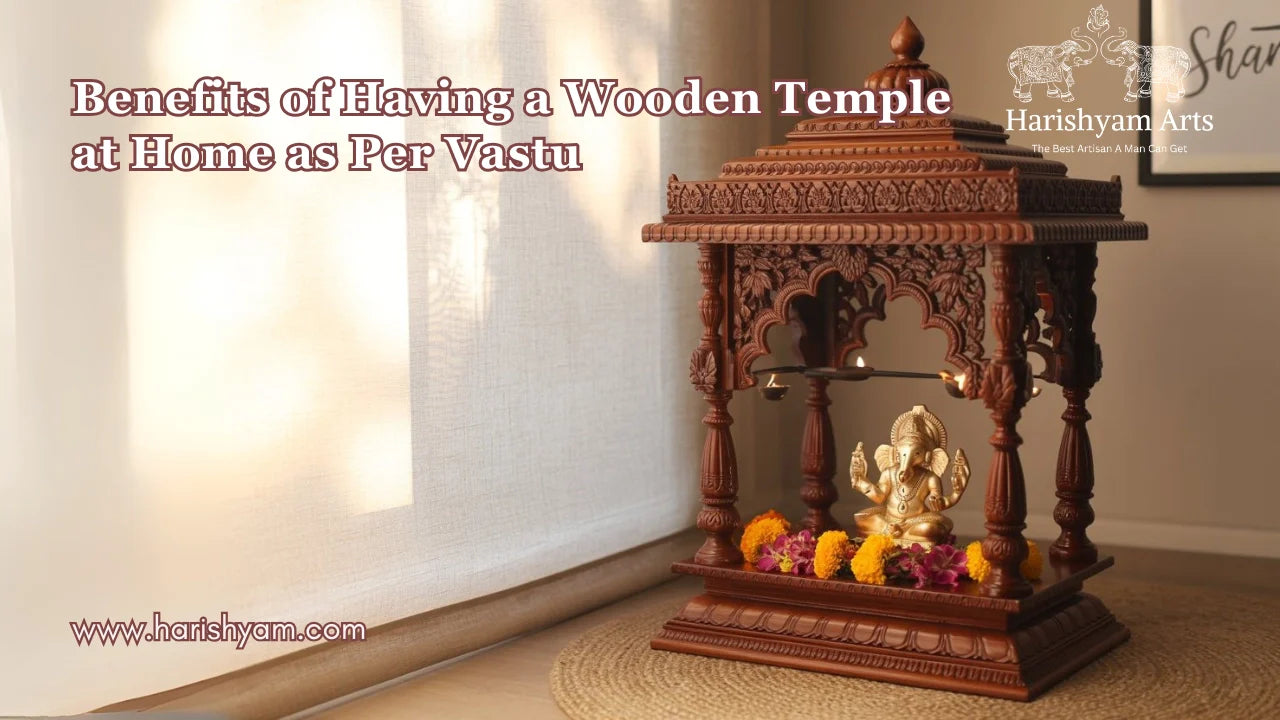
In Indian homes, the presence of a pooja mandir is not just a matter of tradition—it’s a source of spiritual strength, peace, and positive energy. Among the many types of home temples, wooden temples hold a special place due to their natural aesthetics and powerful Vastu alignment. If you're wondering about the benefits of installing a wooden pooja mandir in your home, the answer lies in both its spiritual significance and its ability to balance the energies within your living space.
According to Vastu Shastra, a wooden temple not only enhances the divine aura of a home but also promotes emotional well-being, prosperity, and inner harmony. In this blog, we’ll explore the importance of wooden temples for homes and how they bring blessings, positivity, and peace when placed in the right direction and with the right intent.
10 Benefits Of A Placing Wooden Temple At Home
1. Promotes Positive Energy Flow
Wood, being a natural material, carries earthy and grounding energy. A wooden temple helps absorb and reflect positive vibrations in the house. According to Vastu, placing a wooden mandir in the right direction—ideally the northeast (Ishan corner)—promotes the free flow of spiritual energy, creating a peaceful and divine atmosphere.
2. Creates a Spiritual Focal Point
A wooden temple provides a dedicated and sacred space for daily prayers and meditation. It helps anchor spiritual energy in the home and acts as a reminder for regular spiritual practice. Having a physical space like this helps integrate mindfulness into daily life.
3. Enhances Aesthetic Appeal and Natural Warmth
Wooden temples come in various elegant designs that blend beautifully with home interiors. Their natural texture adds warmth and a touch of tradition to the décor. The visual appeal of a carved wooden mandir often enhances the ambiance of your puja room or corner.
4. Balances the Panch Tattvas (Five Elements)
Wood represents the ‘Earth’ and ‘Air’ elements in Vastu. By installing a wooden temple, you create a natural balance among the five essential elements—earth, water, fire, air, and space—thus harmonizing your home environment and attracting prosperity and health.
5. Improves Mental Peace and Clarity
Spending time near the wooden temple, especially during early morning or evening prayers, has a calming effect. The natural material of wood, combined with the practice of devotion, creates a serene environment that helps reduce stress, improve focus, and bring mental clarity.
6. Supports Financial and Professional Growth
According to Vastu Shastra, regularly praying in a wooden temple placed in the correct direction can remove obstacles in career and finances. The positive energy that emanates from a well-maintained puja space encourages confidence, focus, and decision-making abilities.
7. Strengthens Family Bonds
A shared family practice of offering prayers can enhance emotional bonding among family members. When placed in a common area, a wooden temple encourages collective spiritual activity, reinforcing unity, respect, and emotional support within the family.
8. Ideal for Customization and Symbolism
Wooden temples can be custom-made according to Vastu guidelines. You can include symbols like Om, Swastika, Kalash, and sacred geometries to enhance their spiritual power. Each design element can be tailored to suit both your home’s aesthetics and energy needs.
9. Durable and Long-lasting
Unlike some other materials, quality wooden temples are sturdy, durable, and easy to maintain. With proper care, they can last for generations, becoming a spiritual heirloom passed down in the family, which continues to bless the home for years.
10. Harmonizes the Space Spiritually and Emotionally
Wood has a soothing and healing aura. When you place a wooden mandir in a clean, clutter-free space, it transforms that area into a sanctuary of divine energy. This harmony improves both the spiritual and emotional environment, encouraging positivity in thoughts, speech, and actions.
Final Thoughts
Placing a wooden temple at home, as per Vastu, is more than a ritualistic decision—it is an investment in spiritual growth, emotional well-being, and holistic living. Whether you live in a compact apartment or a spacious house, even a small wooden mandir in the right location can attract peace, prosperity, and divine blessings.
So, if you’re planning to bring a pooja mandir for home, follow the Vastu guidelines and choose a design that resonates with your beliefs and decor. Your home will not just look more beautiful—it will feel more sacred too.
FAQs: Wooden Temples and Their Vastu Benefits
1. What are the best astrological aspects of placing a wooden temple at home?
Ans: Astrologically, placing a wooden temple in the northeast (Ishan) corner of the home is considered highly auspicious. This direction is ruled by Jupiter (Guru), the planet of wisdom and spirituality. A wooden temple enhances the positive influence of Jupiter, attracting divine blessings, knowledge, peace, and spiritual growth in the household.
2. What is the importance of a wooden temple for homes?
Ans: A wooden temple brings a sense of sacredness and balance to the home. As per Vastu, wood is a natural element that promotes calmness and grounding. Installing a wooden pooja mandir creates a dedicated space for devotion, helps channel positive energy, and reinforces the spiritual foundation of the household.
3. Is a wooden temple good for home?
Ans: Yes, a wooden temple is highly recommended for homes. It is not only aesthetically pleasing but also spiritually powerful. Wood as a material is believed to attract and retain positive energy, making it ideal for prayer spaces. When placed according to Vastu guidelines, it enhances mental peace, harmony, and prosperity.
4. Which type of wood is best for a home temple?
Ans: According to Vastu and traditional beliefs, teak wood, Sheesham (Indian rosewood), and mango wood are considered best for home temples. These types of wood are durable, spiritually significant, and carry positive vibrations. Teak, in particular, is associated with strength and longevity, making it a preferred choice.
5. Can we place a wooden temple in the living room or bedroom?
Ans: Yes, you can place a wooden temple in the living room if it faces the correct direction (preferably northeast or east). However, placing it in the bedroom is generally discouraged unless space constraints demand it. In such cases, ensure the temple is kept covered when not in use and maintained with utmost respect and cleanliness.
6. Where can I find the best wooden temples?
Ans: For high-quality, handcrafted wooden temples that perfectly blend traditional craftsmanship with Vastu principles, Harishyam Arts is one of the most trusted names. We specialize in creating exquisite wooden pooja mandirs made from premium woods like teak and Sheesham, designed to bring positive energy and elegance to your home.
Whether you live in India or abroad, Harishyam Arts offers international shipping to countries including the USA, UK, Canada, Australia, UAE, Mauritius, Germany, and many more. Our teak wood temples are carefully packaged to ensure they reach you safely, so you can enjoy the spiritual benefits and timeless beauty of a wooden temple wherever you are in the world.
In Indian homes, the presence of a pooja mandir is not just a matter of tradition—it’s a source of spiritual strength, peace, and positive energy. Among the many types of home temples, wooden temples hold a special place due to their natural aesthetics and powerful Vastu alignment. If you're...

Lakshay Sharma
I’m Lakshay Sharma, a writer with a deep passion for Hindu mythology, Vastu Shastra, and home interiors. I enjoy exploring the rich traditions of Hindu gods and goddesses, sharing insights into Vastu principles, and offering guidance on creating sacred spaces like Puja Mandirs. Through my writing, I aim to inspire harmony and spiritual well-being, blending traditional knowledge with modern perspectives.
Harishyam Arts | Jaipur
Related Blogs

How to Choose Classic Wooden Temple Furniture That Lasts Generations
Lakshay Sharma | December 08, 2025
A temple at home is not just a space for devotion; it is a sanctuary that refl...
Read More...
How Different Woods Affect Religious Statue Quality: Teak, Sheesham, Sandalwood, and More
Lakshay Sharma | December 07, 2025
Artistry in religious statues is not just about skill or devotion—it is also d...
Read More...
Guide to Inlay, Meenakari and Gold Leaf Work on Marble Idols
Lakshay Sharma | December 06, 2025
Marble has been cherished for centuries for its timeless beauty, durability, a...
Read More...
Brass Idols vs. Other Materials: Comparing Durability, Look, and Spiritual Aura
Lakshay Sharma | December 05, 2025
In the world of sacred art and worship, the material chosen for an idol or mur...
Read More...
Makar Sankranti 2026: Date, Significance, Puja Method, and Celebration Tips
Lakshay Sharma | December 04, 2025
Makar Sankranti is one of the most awaited festivals in India, celebrated with...
Read More...
Teak Wood, Sheesham and MDF for Mandirs: Pros and Cons Explained
Lakshay Sharma | December 03, 2025
Choosing the right material for your home mandir is an important decision—one ...
Read More...
First-Time Buyer Guide to Ordering Custom Marble Murtis Online from Jaipur
Lakshay Sharma | December 02, 2025
Why Jaipur Is Famous for Marble Murtis
Jaipur ...
Read More...
Why Carved Teak Wood Furniture Is Making a Comeback in Indian Homes
Lakshay Sharma | December 01, 2025
Indian homes have always embraced tradition, craftsmanship, and timeless beaut...
Read More...
How to Choose the Ideal Pooja Mandir for Your Home: Material, Size, and Style
Lakshay Sharma | November 30, 2025
A pooja mandir is the sacred heart of every Indian home, where spirituality me...
Read More...Who is Ghantaghar Mahavir Swami? The Spiritual Legacy Behind the Iconic Name
Lakshay Sharma | November 29, 2025
The term “Ghantaghar Mahavir Swami” refers to the di...
Read More...
Guidelines for gifting god idols to others
Lakshay Sharma | November 28, 2025
Gifting a God idol is considered a highly auspicious act in Indian tradition. ...
Read More...
What happens if God idol breaks by mistake
Lakshay Sharma | November 27, 2025
God idols represent purity, devotion, and divine energy in every Hindu home. W...
Read More...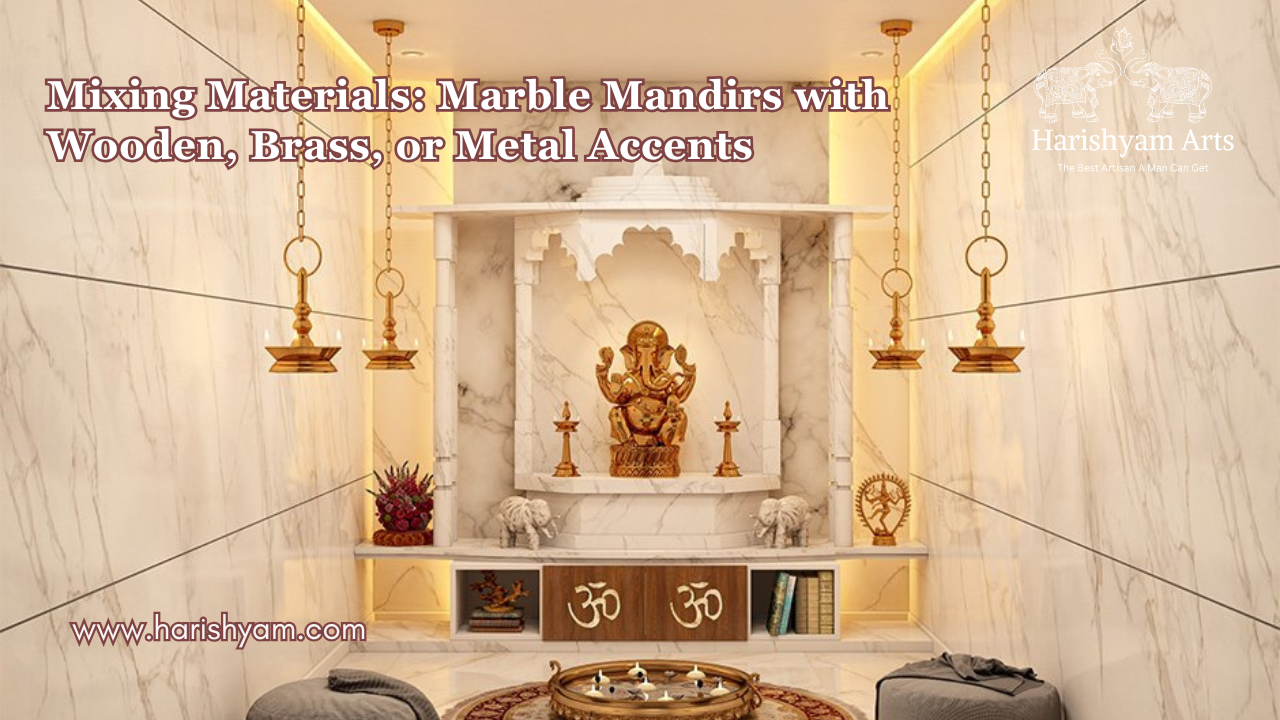
Mixing Materials: Marble Mandirs with Wooden, Brass, or Metal Accents
Lakshay Sharma | November 26, 2025
Combining marble with wooden, brass, or metal accents transforms a simple mand...
Read More...
Step-by-Step Guide to Professional Marble Statue Repainting
Lakshay Sharma | November 24, 2025
Marble statues are timeless masterpieces that reflect devotion, beauty, and cr...
Read More...
Is It Okay to Hang a Mandir on a Wall? A Complete Guide to Wall-Mounted Temples
Lakshay Sharma | November 23, 2025
In today’s fast-paced world, where urban homes are becoming more compact and s...
Read More...
Who is Parashvanath? The Life and Legacy of Jainism’s 23rd Tirthankara
Lakshay Sharma | November 22, 2025
Faith and spirituality are cornerstones of Indian tradition, and Jainism stand...
Read More...
How to Choose Between Carved and Minimalistic Wooden Mandirs
Lakshay Sharma | November 21, 2025
A home mandir (temple) is far more than just a piece of furniture; it is the s...
Read More...
How to clean silver god idols at home
Lakshay Sharma | November 21, 2025
At Harishyam Arts, we understand the spiritual and aesthetic significance of s...
Read More...
Are Marble Dust Statues Ideal for Your Home Temple? Pros & Cons
Lakshay Sharma | November 19, 2025
When it comes to selecting statues for your home temple, marble dust statues h...
Read More...
Where to Buy Authentic Marble Gods' Moortis in the USA: A Guide for Devotees and Collectors
Lakshay Sharma | November 19, 2025
For devotees and collectors in the USA seeking authentic marble Hindu god moor...
Read More...
Maa Parvati 108 Names in Sanskrit and English: Their Significance, Meaning, and Mantra Power
Lakshay Sharma | November 17, 2025
The Divine Essence of Maa Parvati
Maa Parvati,...
Read More...
8 Guidelines for Setting Up Your Home Mandir with Wooden Murtis: Location, Selection, and Maintenance.
Lakshay Sharma | November 16, 2025
Introduction: The Divine Mother of Strength and Compassion

Who Was Jain Mahavir? The Life, Teachings, and Legacy of the 24th Tirthankara
Lakshay Sharma | November 15, 2025
Lord Mahavir, the 24th Tirthankara of Jainism, was a spiritual reformer who re...
Read More...
Benefits of Choosing Corian Mandirs Over Marble and Wood
Lakshay Sharma | November 14, 2025
Modern homes today demand elegance, functionality, and easy upkeep — and Coria...
Read More...
White vs. Black Shivling: Which One Is Best for Your Home and Why?
Lakshay Sharma | November 13, 2025
The Shivling, a sacred symbol of Lord Shiva, embodies creation, power, and pur...
Read More...
10 Stunning Marble Handicraft Pieces to Elevate Your Home Décor
Lakshay Sharma | November 12, 2025
Marble handicrafts represent timeless artistry, luxury, and devotion. At Haris...
Read More...
Brass Ganesha Idols as Gifts: Symbolism, Occasions, and Gifting Etiquette
Lakshay Sharma | November 11, 2025
Gifting a brass Ganesha idol is more than a gesture—it's a blessing of prosper...
Read More...
Luxury Kids Room Decor Ideas That Turn Every Space Into a Fairytale Dream
Lakshay Sharma | November 10, 2025
Transforming a child’s room into a luxury fairytale dream combines comfort wit...
Read More...
Why Repainting Your Marble Statue Can Extend Its Life and Beauty
Lakshay Sharma | November 09, 2025
Marble statues are elegant pieces of art that add charm to any home or temple....
Read More...
How to Choose the Perfect Wall-Mounted Wooden Mandir for Your Home
Lakshay Sharma | November 08, 2025
A wall-mounted wooden mandir is more than just a spiritual corner; it’s a blen...
Read More...
Understanding GST on Marble God Statues: A Complete Guide for Buyers and Sellers
Lakshay Sharma | November 07, 2025
Marble god statues are a popular choice for temples, homes, and offices due to...
Read More...
Are Wooden Statues Pest-Resistant? How to Protect Your Wooden Idols from Insects and Damage
Lakshay Sharma | November 06, 2025
Wooden statues have been cherished for centuries due to their natural beauty a...
Read More...
Corian vs Wooden Temples: Which One Should You Choose?
Lakshay Sharma | November 05, 2025
Choosing the perfect temple for your home is more than just selecting a design...
Read More...
How Customised Marble Human Bust Manufacturers Bring Personalities to Life
Lakshay Sharma | November 04, 2025
Crafting a marble human bust is so much more than sculpting a likeness—it's ab...
Read More...
The Power of the Hare Krishna Maha Mantra: Awakening Spiritual Bliss
Lakshay Sharma | November 03, 2025
The Hare Krishna Maha Mantra is a sacred chant that ...
Read More...
The 24 Tirthankaras of Jainism: Names, Symbols, and Significance
Lakshay Sharma | November 02, 2025
In Jainism, the Tirthankaras are revered as divine s...
Read More...
Top 25 Space-Saving Wooden Mandir Ideas for Modern Homes
Lakshay Sharma | November 01, 2025
A pooja mandir is the heart of every Indian home — a sacred corner where peace...
Read More...
What Are the 8 Forms of Lakshmi? | Ashta Lakshmi Meaning and Significance
Lakshay Sharma | October 31, 2025
The Divine Essence of Goddess Lakshmi
Goddess La...
Read More...
The Art of Craftsmanship: How Handmade Brass Statues Are Created
Lakshay Sharma | October 30, 2025
At Harishyam Arts, we celebrate the timeless beauty ...
Read More...
How to Dispose of Broken Marble God Murti
Lakshay Sharma | October 30, 2025
In Hindu tradition, marble murtis represent divine presence and spiritual ener...
Read More...
Wooden Statues vs Marble Statues: Which One Should You Choose?
Lakshay Sharma | October 29, 2025
When it comes to decorating your home or creating a sacred space, choosing the...
Read More...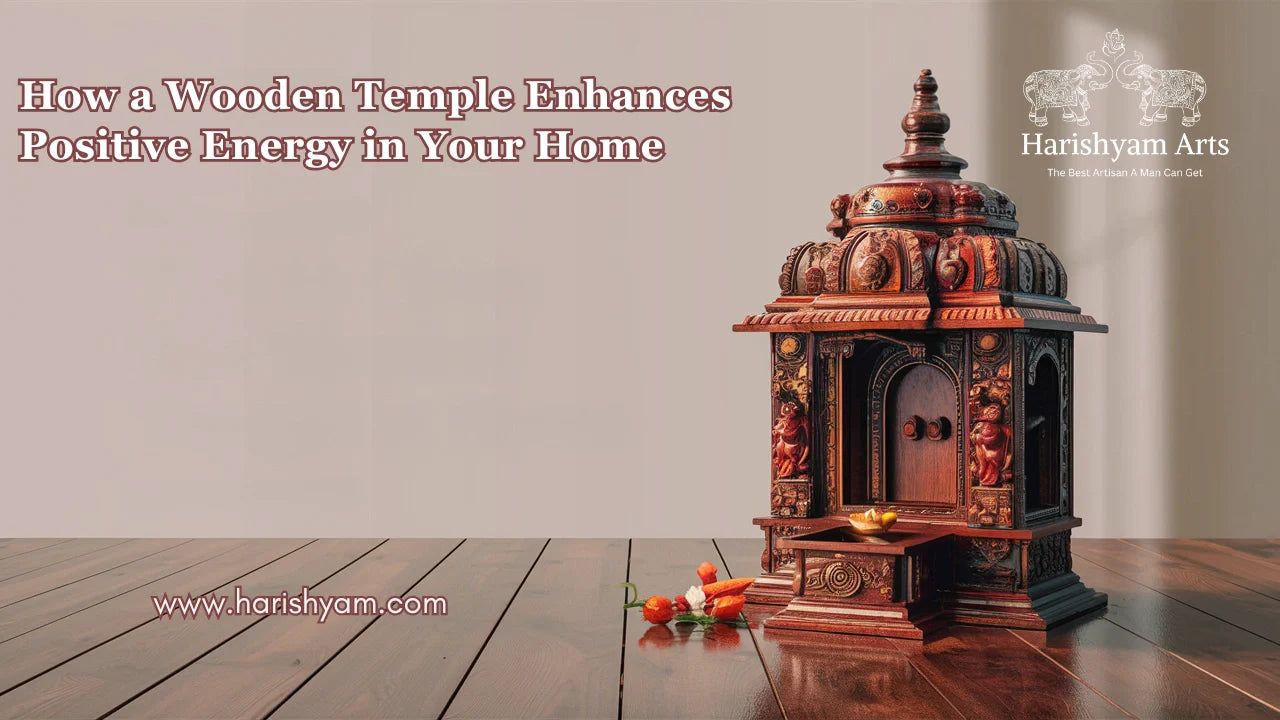
How a Wooden Temple Enhances Positive Energy in Your Home
Lakshay Sharma | October 28, 2025
A home temple isn’t just a decorative corner — it’s the spiritual...
Read More...
Why Lord Krishna is Worshipped in Different Forms Across India
Lakshay Sharma | October 27, 2025
Lord Krishna — the eighth incarnation of Lord Vishnu — is one of the most belo...
Read More...
The Story of Goddess Saraswati: The Embodiment of Wisdom and Knowledge
Lakshay Sharma | October 26, 2025
Among the many deities of the Hindu pantheon, Maa Saraswati Read More...

Top Reasons to Choose Brass Statues for Home Décor and Spiritual Spaces
Lakshay Sharma | October 25, 2025
Home décor today is not only about beauty—it’s about creating a peaceful and m...
Read More...
How long do Corian temples last?
Lakshay Sharma | October 24, 2025
Choosing the right material for a temple at home is important for both aesthet...
Read More...
Why Lord Shiva is Called the Mahadeva – The Supreme God
Lakshay Sharma | October 23, 2025
Hinduism, one of the world’s oldest religions, has a rich pantheon of deities,...
Read More...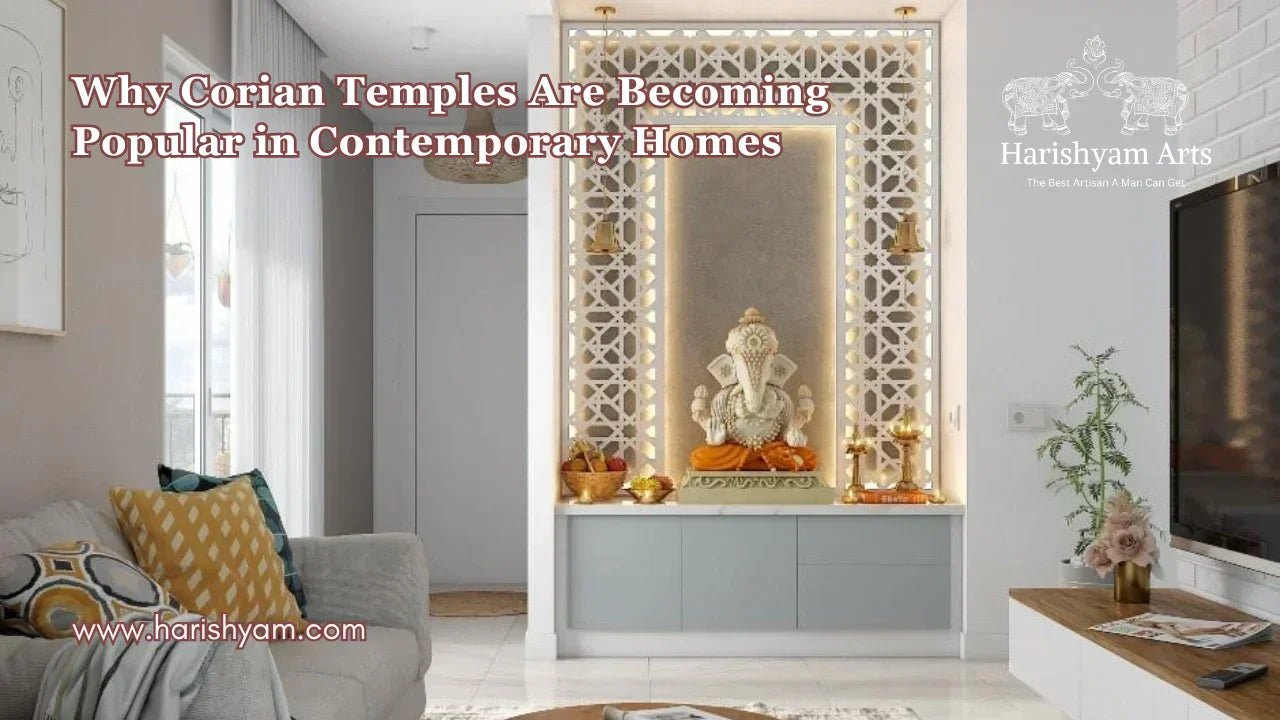
Why Corian Temples Are Becoming Popular in Contemporary Homes
Lakshay Sharma | October 22, 2025
In today’s modern homes, interior décor blends tradition with contemporary sty...
Read More...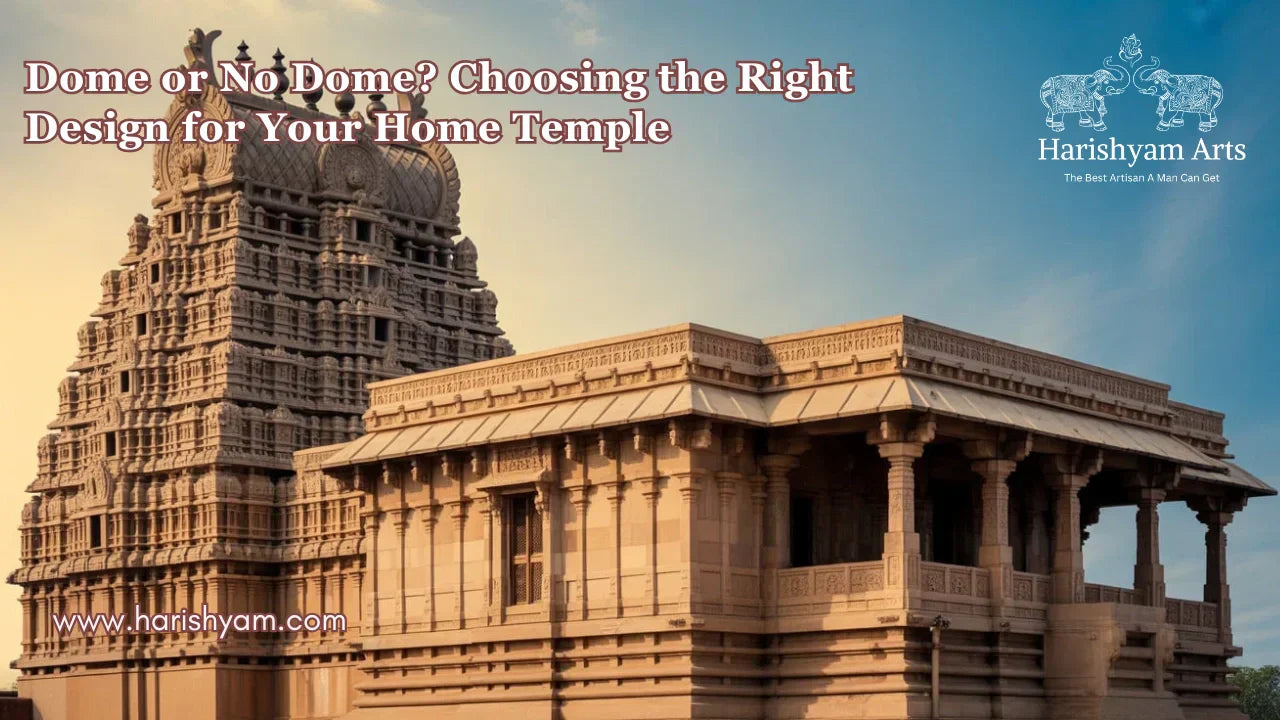
Dome or No Dome? Choosing the Right Design for Your Home Temple
Lakshay Sharma | October 21, 2025
Creating a sacred space at home is a spiritual investment, and the design of y...
Read More...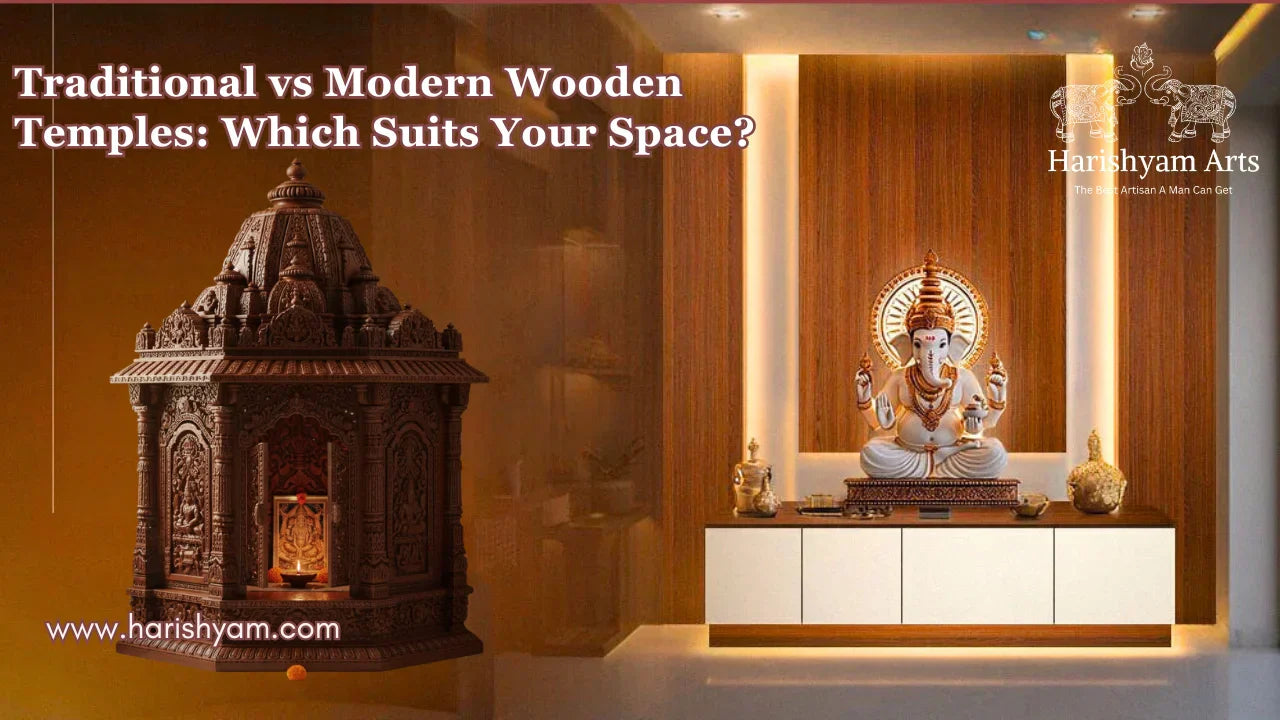
Traditional vs Modern Wooden Temples: Which Suits Your Space?
Lakshay Sharma | October 20, 2025
Creating a sacred space in your home is more than just interior décor — it’s a...
Read More...



